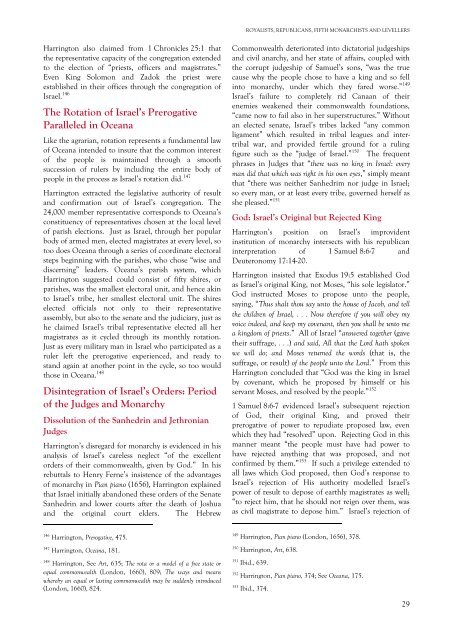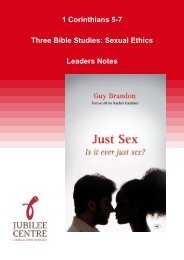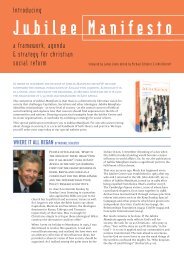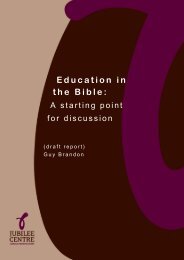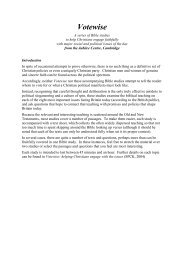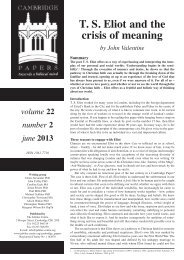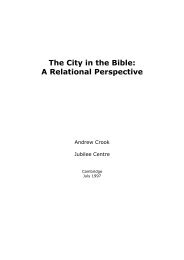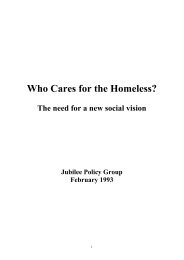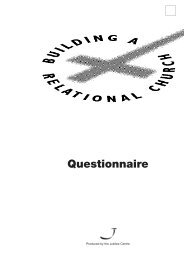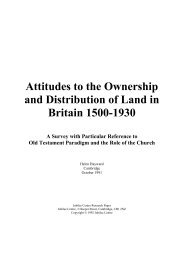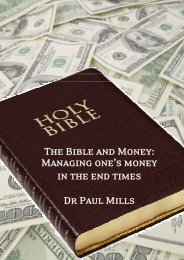Report Template - Jubilee Centre
Report Template - Jubilee Centre
Report Template - Jubilee Centre
Create successful ePaper yourself
Turn your PDF publications into a flip-book with our unique Google optimized e-Paper software.
ROYALISTS, REPUBLICANS, FIFTH MONARCHISTS AND LEVELLERS<br />
Harrington also claimed from 1 Chronicles 25:1 that<br />
the representative capacity of the congregation extended<br />
to the election of “priests, officers and magistrates.”<br />
Even King Solomon and Zadok the priest were<br />
established in their offices through the congregation of<br />
Israel. 146<br />
The Rotation of Israel’s Prerogative<br />
Paralleled in Oceana<br />
Like the agrarian, rotation represents a fundamental law<br />
of Oceana intended to insure that the common interest<br />
of the people is maintained through a smooth<br />
succession of rulers by including the entire body of<br />
people in the process as Israel’s rotation did. 147<br />
Harrington extracted the legislative authority of result<br />
and confirmation out of Israel’s congregation. The<br />
24,000 member representative corresponds to Oceana’s<br />
constituency of representatives chosen at the local level<br />
of parish elections. Just as Israel, through her popular<br />
body of armed men, elected magistrates at every level, so<br />
too does Oceana through a series of coordinate electoral<br />
steps beginning with the parishes, who chose “wise and<br />
discerning” leaders. Oceana’s parish system, which<br />
Harrington suggested could consist of fifty shires, or<br />
parishes, was the smallest electoral unit, and hence akin<br />
to Israel’s tribe, her smallest electoral unit. The shires<br />
elected officials not only to their representative<br />
assembly, but also to the senate and the judiciary, just as<br />
he claimed Israel’s tribal representative elected all her<br />
magistrates as it cycled through its monthly rotation.<br />
Just as every military man in Israel who participated as a<br />
ruler left the prerogative experienced, and ready to<br />
stand again at another point in the cycle, so too would<br />
those in Oceana. 148<br />
Disintegration of Israel’s Orders: Period<br />
of the Judges and Monarchy<br />
Dissolution of the Sanhedrin and Jethronian<br />
Judges<br />
Harrington’s disregard for monarchy is evidenced in his<br />
analysis of Israel’s careless neglect “of the excellent<br />
orders of their commonwealth, given by God.” In his<br />
rebuttals to Henry Ferne’s insistence of the advantages<br />
of monarchy in Pian piano (1656), Harrington explained<br />
that Israel initially abandoned these orders of the Senate<br />
Sanhedrin and lower courts after the death of Joshua<br />
and the original court elders. The Hebrew<br />
Commonwealth deteriorated into dictatorial judgeships<br />
and civil anarchy, and her state of affairs, coupled with<br />
the corrupt judgeship of Samuel’s sons, “was the true<br />
cause why the people chose to have a king and so fell<br />
into monarchy, under which they fared worse.” 149<br />
Israel’s failure to completely rid Canaan of their<br />
enemies weakened their commonwealth foundations,<br />
“came now to fail also in her superstructures.” Without<br />
an elected senate, Israel’s tribes lacked “any common<br />
ligament” which resulted in tribal leagues and intertribal<br />
war, and provided fertile ground for a ruling<br />
figure such as the “judge of Israel.” 150 The frequent<br />
phrases in Judges that “there was no king in Israel: every<br />
man did that which was right in his own eyes,” simply meant<br />
that “there was neither Sanhedrim nor judge in Israel;<br />
so every man, or at least every tribe, governed herself as<br />
she pleased.” 151<br />
God: Israel’s Original but Rejected King<br />
Harrington’s position on Israel’s improvident<br />
institution of monarchy intersects with his republican<br />
interpretation of 1 Samuel 8:6-7 and<br />
Deuteronomy 17:14-20.<br />
Harrington insisted that Exodus 19:5 established God<br />
as Israel’s original King, not Moses, “his sole legislator.”<br />
God instructed Moses to propose unto the people,<br />
saying, “Thus shalt thou say unto the house of Jacob, and tell<br />
the children of Israel, . . . Now therefore if you will obey my<br />
voice indeed, and keep my covenant, then you shall be unto me<br />
a kingdom of priests.” All of Israel “answered together (gave<br />
their suffrage, . . .) and said, All that the Lord hath spoken<br />
we will do; and Moses returned the words (that is, the<br />
suffrage, or result) of the people unto the Lord.” From this<br />
Harrington concluded that “God was the king in Israel<br />
by covenant, which he proposed by himself or his<br />
servant Moses, and resolved by the people.” 152<br />
1 Samuel 8:6-7 evidenced Israel’s subsequent rejection<br />
of God, their original King, and proved their<br />
prerogative of power to repudiate proposed law, even<br />
which they had “resolved” upon. Rejecting God in this<br />
manner meant “the people must have had power to<br />
have rejected anything that was proposed, and not<br />
confirmed by them.” 153 If such a privilege extended to<br />
all laws which God proposed, then God’s response to<br />
Israel’s rejection of His authority modelled Israel’s<br />
power of result to depose of earthly magistrates as well;<br />
“to reject him, that he should not reign over them, was<br />
as civil magistrate to depose him.” Israel’s rejection of<br />
146<br />
Harrington, Prerogative, 475.<br />
147<br />
Harrington, Oceana, 181.<br />
148<br />
Harrington, See Art, 635; The rota or a model of a free state or<br />
equal commonwealth (London, 1660), 809; The ways and means<br />
whereby an equal or lasting commonwealth may be suddenly introduced<br />
(London, 1660), 824.<br />
149<br />
Harrington, Pian piano (London, 1656), 378.<br />
150<br />
Harrington, Art, 638.<br />
151<br />
Ibid., 639.<br />
152<br />
Harrington, Pian piano, 374; See Oceana, 175.<br />
153<br />
Ibid., 374.<br />
29


